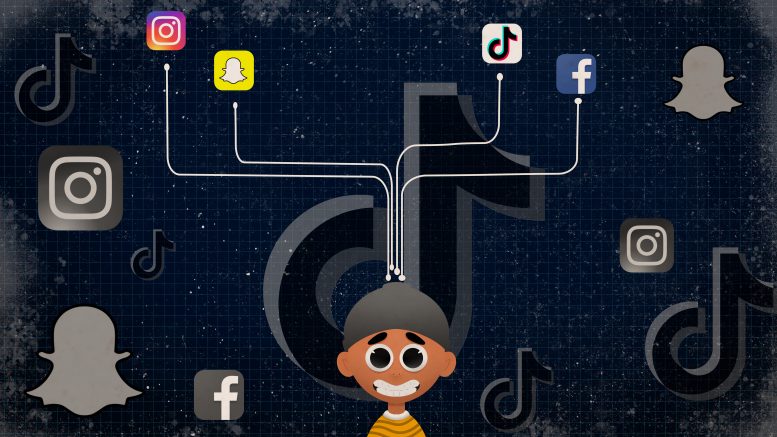Julian Michanie/Contributing Writer
On Sept. 20, President Donald Trump announced plans to ban TikTok, to the dismay of fans everywhere. With the Chinese video-sharing application pinned under the microscope, it’s crucial to understand how banning or restricting the app would promote better mental health for young adults and limit the growing problem of the over-sexualization of minors.
Although not the root cause of the social issues prevalent in our society, social media such as Facebook, Instagram, Snapchat and TikTok, only adds gasoline to the flames of sexism, misogyny, body shaming and the sexualization of minors, encouraging people to assume and harass young girls in particular.
On these apps, the line between sex positivity and sexualization has become increasingly blurred. “Sex positivity encourages and promotes the expression of sexuality as a healthy and natural occurrence when placed in the context of consent and autonomy,” reads an article published by ECPAT-USA, a non-profit that works on the issue of commercial sexual exploitation of children. “Sexualization is related to assigning sexuality to someone or something else, regardless of the subject’s knowledge or consent.”
In clearer terms, anyone has the right to post any picture they want. It’s only when they are harassed or assumed to want something sexual, that they are being oversexualized.
On these apps, the line between sex positivity and sexualization has become increasingly blurred.
In the case of TikTok, which is currently under review, people are required to be at least 13 years old to sign up, but there is no verification, meaning any kid with access to the app can sign up and be exposed to language and videos that are explicit. The result is minors being desensitized and vulnerable to harassment from older kids or adults.
“I definitely feel like it’s super easy for minors to be over-sexualized,” said Tamara Avinami, a 17-year old YouTuber with over 148,000 subscribers. “Sometimes I do get extremely uncomfortable and don’t know whether to block the person or let them be. There isn’t much you can do.”
Minors are also being exploited on the app without them even knowing. Using features like “Duet,” one person can react to or copy a video posted by someone else. The White Hatter, an organization committed to internet and social media safety and literacy, has reported on underground “TikTok porn groups” that use videos of minors to make obscene duets.
The app has become a hunting ground for pedophiles through messaging and influencing feeds as well, but unfortunately, it does not stop there. Other video-sharing platforms like YouTube have also faced controversy for an algorithm that contributes to child exploitation in the past.
“I feel like when younger girls see explicit content on social media they feel pressured or desire to want to do it and fit in,” says Tamara. “Don’t just do a trend because you see other girls doing it… Half of the time the trends being done are extremely sexual, so if you wouldn’t want your parents seeing it, don’t post it.”
More recently, the streaming service Netflix has also been under fire for its new movie, “Cuties,” for sexualizing young girls. A recent article published by Variety broke down the different aspects of the film that are problematic, from costumes to dance routines. In one scene, a girl who is underaged gets pressured to take nude pictures of herself and post them online.
Even under all the scrutiny, Netflix has continued to defend the movie, stating, “the subject of ‘Cuties’ isn’t twerking; it’s children, especially poor and nonwhite children, who are deprived of the resources — the education, the emotional support, the open family discussion — to put sexualized media and pop culture into perspective.”
Even with these verbal goals, the way the film tries to portray them is in a lack of better words, pathetic. Instead of focusing on the actual problem that they claim causes the sexualization of minors, they exploit those scenes for a bigger audience.
With virtually unlimited access to the Internet, we see alarming rates of minors falling victim to predators who use apps such as TikTok as hunting grounds. If TikTok was to be monitored or even banned, and services such as Netflix reprimanded for their over-sexualization of minors, then kids could stop worrying about how to get the most views in a culture that promotes sex positivity and not sexualization.
DISCLAIMER:
The opinions presented within this page do not represent the views of PantherNOW Editorial Board. These views are separate from editorials and reflect individual perspectives of contributing writers and/or members of the University community.






Be the first to comment on "How Today’s Pop Culture And Social Media Sexually Exploit Minors"